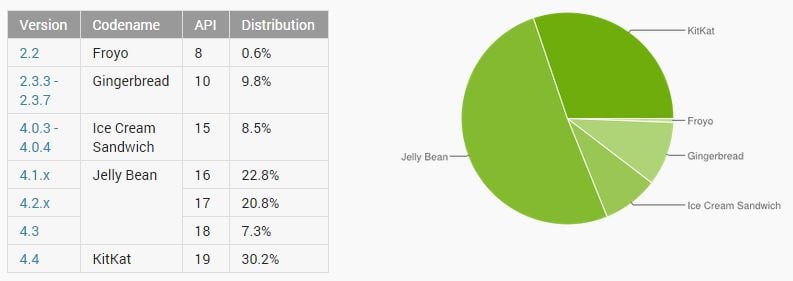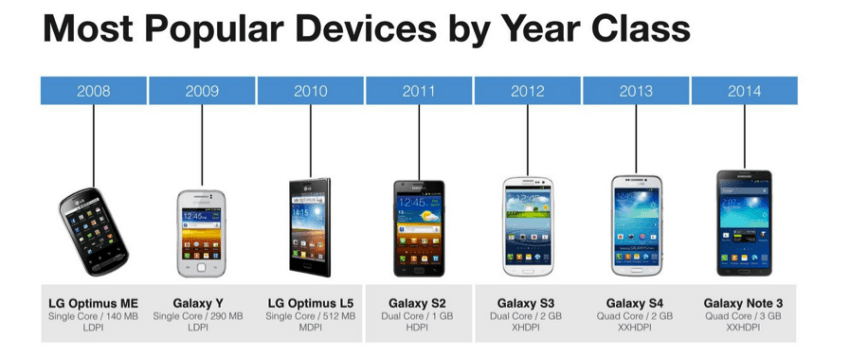… or so say analysts from Facebook, still wielding the title of one of the most popular social networking sites in the world. More specifically speaking: to say this is not about the system (this of course is constantly evolving), but on the device on which it is installed and its use by users. How they came to these conclusions? Let’s start from the beginning.
As is widely known one of the characteristic features of Android is huge fragmentation. On the market there are countless different kinds of tablets and smartphones running different versions of the same system. At the beginning of the month “balance of power” was as follows:

This situation is a real nuisance for developers applications for mobile devices who need to take care of that their products run on the largest number of devices. Most of them are trying to so closely monitor these divisions and devote attention to the most popular versions of the system. Unfortunately, the case is complicated by the fact that the new incarnation of the Green Robot occur fairly regularly, and the old ones do not intend to go into retirement (as evidenced by the presence of Froyo in the table above). What’s more, the world is ruled by androidowych update their own laws, which often happens that the chart-topping device known companies have older software than their weaker and less jack a competitors. In short: the version of the system under which the equipment is running, slowly ceases to be a determinant of its “power”.
This situation meant that the developers responsible for mobile applications Facebook began looking for a new classification criteria that will allow them to better understand the needs and expectations of users. The result of this search is the Year Class – brilliant in its simplicity, the system allows you to specify the hardware “age” of the device. The first step was to analyze the most popular models released on the market in the last few years, and choosing among them those on release represent the highest quality available to the everyman.

The next step consisted on the analysis of the currently in-use devices for technical specifications and determine which was the product of such parameters deserve to be called a first-class equipment. This method was tested over ten thousand different models belonging to more than half a billion users connecting to Facebook using the “green” tablets and smartphones. The result? As the title. Two-thirds of users are using the equipment, which in terms of technical parameters can not be matched models from 2011. Put simply: the majority of which are currently in use Android devices has less than 1 GB of RAM and a dual-core processor with a clock frequency of 1.2 GHz. Of course, these figures should be treated with a certain distance. It is well known that the number of dry technical specifications are not just fully reflect the quality of your tablet, and many of the “poor” but a well-designed models can boast better performance and liquidity actions since his “swanky” brothers.
Thus, what is worth noting is the fact that the involvement of the developer of Facebook can help to eliminate some of the shortcomings of Android, which – so far – can not cope Google. One must admit that the idea of sharing Android devices to “age group” instead of “system groups” can bring tangible benefits to both developers and users. The authors of the project as an example of its practical application optimization functions provide news in the mobile application on Facebook, which from now on will be displayed to better match the content to the device, which we review them, eg. By reducing the video on tablets too weak to play it smoothly (despite having one of the newer versions of Windows). Changing the way in which application developers look at the potential user base, will not solve the problem, although the vast fragmentation, however, can to some extent alleviate its effects, and that’s at least a step in the right direction.
No comments:
Post a Comment